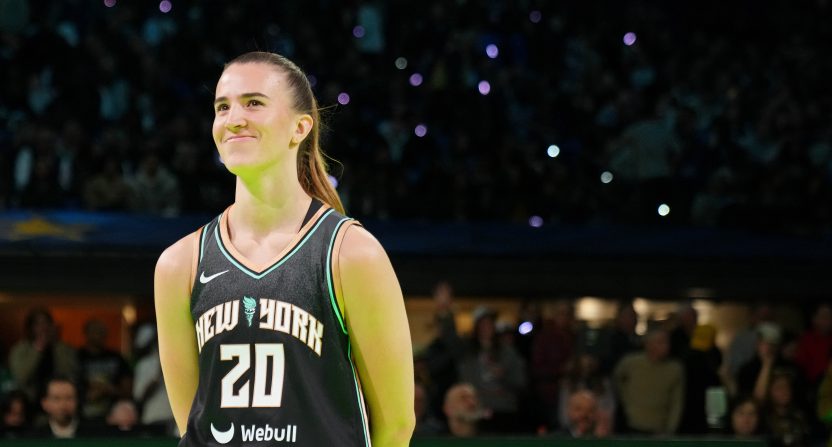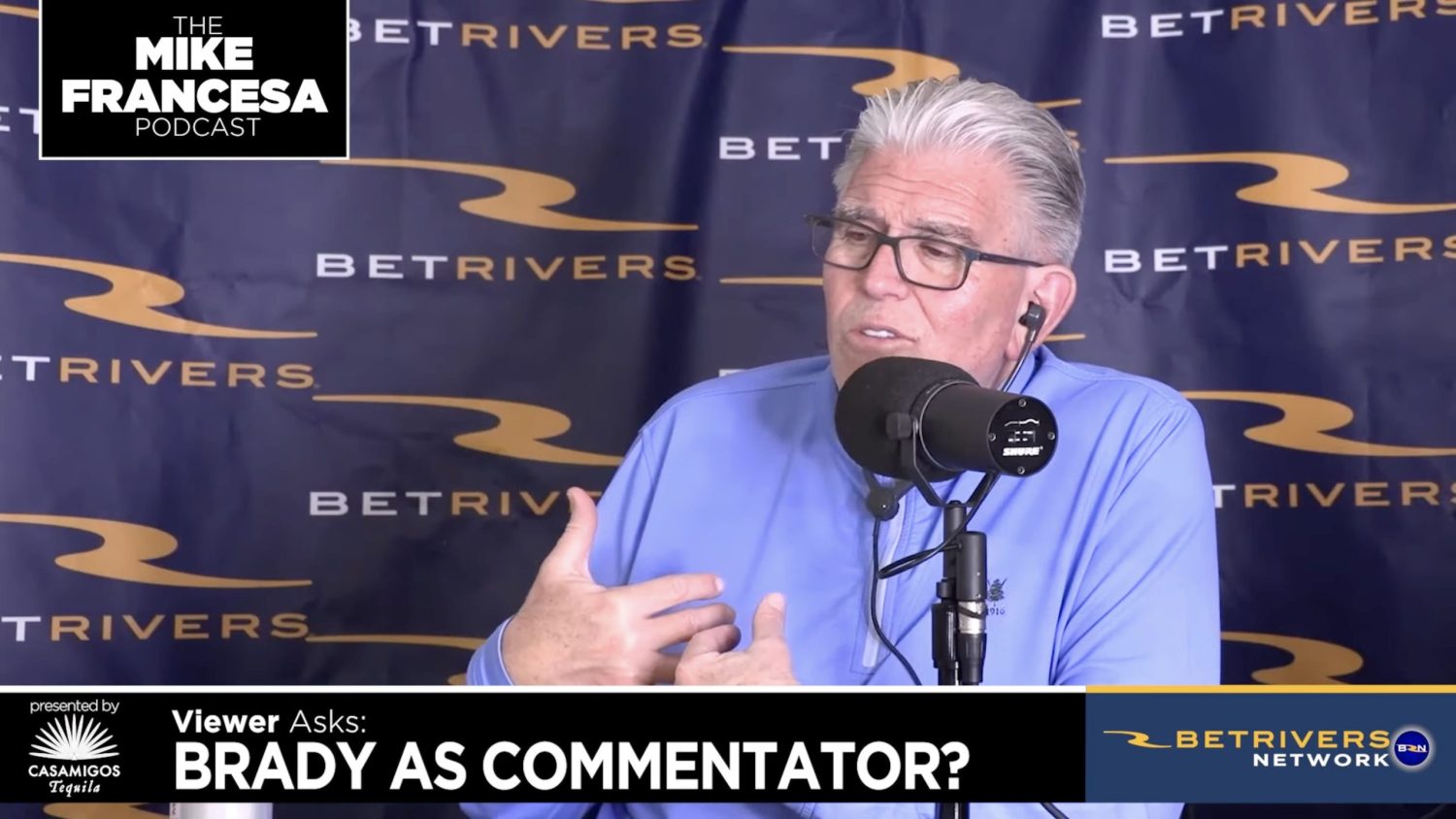Anyone who watched last weekend’s historic three-point shootout between Sabring Ionescu and Steph Curry got a taste of what it’s like to be a woman in sports: No great accomplishment ever goes unpunished.
Last weekend’s NBA All-Star three-point shootout between Steph Curry and Sabrina Ionescu was an event for the ages and months in the making. After Ionescu broke Curry’s three-point competition record at the WNBA All-Star weekend back in July with a score of 37 points, she challenged Curry to a shootout via Twitter. Days later, Curry accepted and the planning began.
The format took some work–when the shootout was originally announced earlier this year, it was advertised Sabrina would be shooting from WNBA distance while Steph would be shooting from NBA distance, but Ionescu quickly set the record straight, and announced she’d be shooting from men’s line.
“Personally, I shoot from that range to begin with,” Ionescu said. “I practice from that range wanting to be a better shooter and a better basketball player. Just get better as a whole. Knowing I had that opportunity to pick what line I wanted to shoot from, it was a no-brainer from when it was first presented that I wanted to shoot from the NBA line.”
Sabrina not only shot from the men’s line–she excelled, scoring 26 points. Although she lost to Curry 29-26, her performance would have landed her in the overall three-point contest finals. The shootout itself was also a huge success, and it makes sense. The showdown between Steph and Sabrina was the modern-version of the infamous 1973 Battle of the Sexes between Billie Jean King and Bobby Riggs, except Steph Curry is actually cool, and it would have been a near-perfect event if not for commentary immediately afterward.
“She should have shot from the 3-point line that the women shoot from,” TNT commentator and former NBA player Kenny Smith said of Ionescu at the conclusion of the competition. “That would have been a fair contest. I still root for Sabrina … But she should have shot from the three-point line that the women shoot from.”
You would think that after Luis Rubiales darkened Spain’s Women’s World Cup victory by assaulting Jenni Hermoso during the winners ceremony or even after sports media was up in arms about Taylor Swift attending the Super Bowl earlier this month, that folks would get the message to just let women in sports enjoy their moments in the spotlight. Smith certainly received backlash for his take. However, that didn’t stop him from doubling-down in his comments about Ionescu the following week on the Stephen A. Smith Show.
“Most people who know basketball understood what I was talking about,” Kenny Smith said. “Actually, I was advocating for her, more than anything else, because basketball is muscle memory. So he practices from one range, she practices from another.”
Either Smith didn’t do his homework – Ionescu has been saying for weeks leading up to the competition that she regularly practices and shoots from men’s distance – or Smith doesn’t understand what advocacy means. You don’t advocate for someone by immediately critiquing them to a crowd of millions after pulling off a historic performance under incredible pressure, nor do you advocate for women by implying that they are weaker, lesser, or deserve special treatment in the name of “fairness.”
The point of the competition wasn’t necessarily for Sabrina to beat Steph (although that would have been the cherry on top) – it was for her to really compete with him, and she did. Implying that Ionescu deserves special treatment is a form of benevolent sexism where attitudes about women seem positive on the surface, but are rooted in sexist beliefs (for example, that because Ionescu is supporting the women’s game, people should go easy on her and hand her the win). It’s not only disrespectful to Ionescu as an athlete, but to women’s basketball as a product. The WNBA doesn’t need a hero to swoop in and save it. The league is (and has been) recording record-breaking numbers and doesn’t need a handout to continue that momentum.
That, essentially, is what’s wrong with Smith’s commentary: it’s lazy, paternalistic, and dismissive. When Steph and Sabrina committed to the competition, they did so to dismantle misconceptions surrounding women’s basketball–to show that, in Ionescu’s words, “if you can shoot, you can shoot.” Period.
“The respect that I’ve been able to receive from the NBA guys,” Ionescu said after the event. “It’s going to show a lot of people that haven’t watched women’s sports that we’re able to go out there and put on a show.”
“Respect” is the key word here. In the world of sports, athletes don’t go easy on opponents they respect–they go all in. Steph did exactly that by giving the shootout his all and so did his sponsor Under Armour, albeit unconventionally. Before the contest, Nike showed its support for Sabrina by tweeting an image of the text: “…best not miss” in reference to Curry in Nike’s signature simplistic copy. Under Armour clapped back after Curry’s win with a photo of him shooting that read “He Don’t.”
— Under Armour Basketball (@UAbasketball) February 17, 2024
Although trash talk is generally seen as disrespectful, it has the opposite effect here. With its tweet, Under Armour acknowledged what Smith failed to: that Ionescu is a legitimate competitor–after all, you don’t gloat about beating a mediocre athlete. In two words, Under Armour showed more respect for Ionescu than Smith did over the entire broadcast and aftermath of the competition. The ad communicates the idea that Ionescu is a formidable opponent and beating her is an accomplishment–both true statements from the men’s line. The implication that Ionescu needed a win over Curry, even by un-leveling the playing field, to support the women’s game, makes the entire event look more like charity than competition.
Not only that, but the idea that the WNBA is the sole beneficiary of the ASG weekend is backward. Although the NBA is the leader in social media among American sports leagues, the league has been dealing with consistent declines in viewership and ratings. Last season was the fifth worst-rated season since 1993-1994, and the All-Star Game and All-Star weekend have been hit particularly hard–last year’s events had 23% less viewers than its previous low in 2021, when sports leagues everywhere were negatively impacted by COVID.
Well, almost all sports leagues.
During the COVID pandemic, the only professional sports leagues to experience gains in viewership and revenue were women’s leagues, and these weren’t paltry gains. The NWSL experienced viewership increases by 500%, and the WNBA 68%. While both leagues have been able to keep up this success–the NWSL experienced viewership gains of 41% on CBS and 83% on Paramount+ and both the WNBA playoffs and regular season were the most watched in decades, the NBA has yet to return to its pre-pandemic levels of success.
The numbers don’t lie–the 2023 WNBA All-Star Game was the most-watched in 16 years, and the NBA felt the “women’s sports effect” last weekend. Viewership of the All-Star weekend increased by 54% from last year as the weekend grossed its highest audience in four years with 5.4 million viewers, including 10 million unique viewers overall. Notably, viewership peaked from 10:00-10:15 PM ET–during the faceoff between Sabrina and Steph.
So while NBA ratings have been declining and plateauing over the past five years–just a little over a decade after they hit all-time highs, the WNBA is nowhere near its viewership ceiling, especially when considering the lack of investment in women’s sports across leagues. But the gains women’s sports are making and the impact this could have on other leagues cannot be ignored because women’s sports are incredibly marketable. Ionescu, who is one of the most marketable athletes in women’s hoops, was the main draw of the weekend and the numbers show it. Cross promotion benefitted the NBA just as much as many assumed it will benefit the WNBA.
Those numbers are yet to be seen, but for now, one thing is clear: women’s sports deserve respect. Kenny Smith should take note.







